'What matters right now is what I am able to do in these times of distress for the people of J&K.'
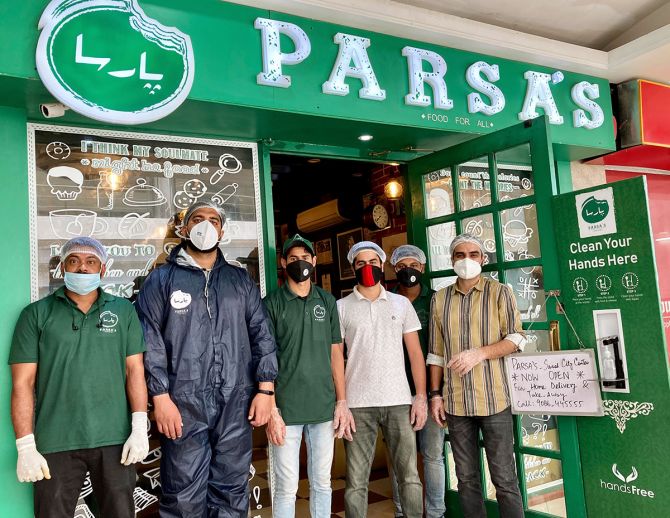
Javid Parsa, 32, left a job at Amazon to start a successful restaurant chain Parsa's. Serving kathi rolls, it has nine outlets in Kashmir and three outside the Union territory.
The Covid pandemic and the shutdown in Kashmir after the abrogation of Article 370 has hit his business hard.
In the last one year, Parsa's has done business only for 25 days. Its Noida outlet is on the verge of closure. A new outlet, which was to open in March, hasn't taken off.
But Javid is not one to bogged down. He has ensured that his non-Kashmiri staff remain in the Kashmir Valley and continue to be paid; while he has put his energy into encouraging Covid-recovered people to donate plasma.
Hoping to re-start and re-build the business once Covid cases reduce to 40 to 50 a day in Kashmir, he says he is determined to stay afloat and come out stronger.
"Even if I have nothing in the next two years and all my outlets get shut, I will learn from this adversity.
If nothing remains in my hand tomorrow, I am going to be there for myself. And that's what matters," he tells Rediff.com's Archana Masih.
As the builder of a successful restaurant franchise, how has your business fared in this difficult time?
From last August we have done business for only 25 days.
In February 2020, we had started a new outlet, but it only could function for 13 days. On March 20, we finally had to shut it down again.
Being born and brought in Kashmir we have gone through many lockdowns.
After the abrogation of Article 370, we were locked down from last August to February 2020 and were still struggling to bounce back from our losses when the Covid pandemic happened.
Whenever there are incidents like the government enforced post-Article 370 lockdown or the coronavirus lockdown, I have always been in the forefront to help and volunteer.
This time, I had to look after 50% of my staff that are non-Kashmiris. I made sure that no employee gets stuck on the national highways on their way home.
I kept paying the salaries. I did not let them leave Kashmir because I was worried about the safety.
We have not opened our outlets and my employees are still here. I kept paying the salaries from my savings.
With business taking such a hit, what is the future of the business that you started with such enthusiasm and success?
It is people who build your business and without them you cannot do much with your brand.
90% of my business is in Kashmir, I have only three outlets outside.
What matters right now is what I am able to do in these times of distress for the people of J&K.
In the past few months of lockdown, I was volunteering for a bigger cause rather than keeping my business open.
We tried to restore home delivery service, but we could not do that for more than five days.
I have voluntarily closed my business even though most of the restaurants in Kashmir are doing home delivering because I care about my employees.
If they are fit, they can help me recover my losses.
I also want to keep my parents safe because if I work in a public place with people and cash exchange. I do not want to put them at risk.
What volunteer work have you been doing?
I volunteered with a few reputed NGOs of the valley and we reached out to around like 1,500 families.
I diverted all my social media energy to fundraising campaigns and encouraging covid recovered patients to donate plasma.
This is what keeps me sane without caring much about money.
It's is not easy for a recovered patient to go back to the hospital to donate plasma.
It needs a lot convincing and confidence-building. That's what I do through my social media handles and I have volunteers in different parts of Kashmir.
We remind them of the time they were in hospital and tell them they can help someone come out of the hospital.
Most of the infected people come from underprivileged backgrounds and rural parts of Kashmir. We have to talk to them and make them understand how useful the blood and plasma can be, and we have been successful in doing that.
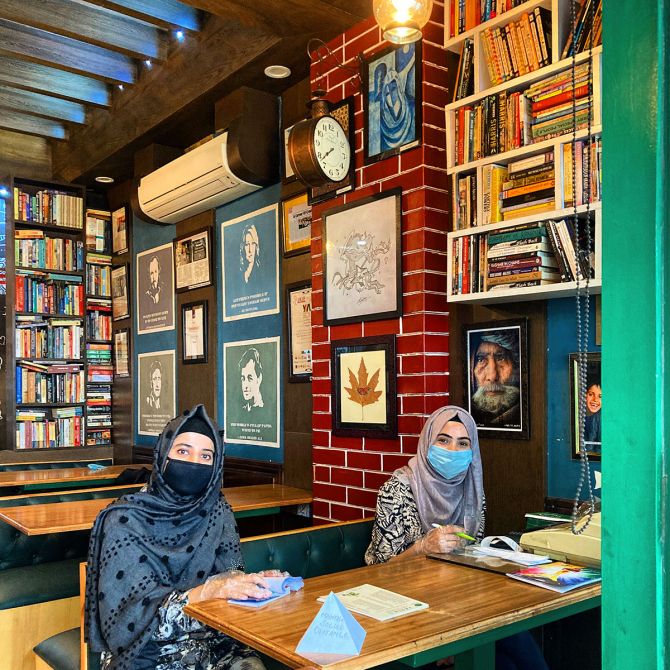
How has Internet connectivity improved in Srinagar?
It is better than before. Wi Fi and broadband is working.
One single social media story of mine which would fetch me 10,000 views in the past, right now is at 4,000 views which means 40% of the people have decent access to the Internet.
How has this year been when you look back after the abrogation?
From the business point of view, it has been the worst year.
But looking at all the learnings and relationships I have built, I'm grateful to Allah for this learning phase of life.
I got to know so many people and met some amazing volunteers. I built up a very strong network outside Jammu and Kashmir when Kashmiri students were stuck last August and were unable to reach out to their families.
The people I met last August are now helping us in raising plasma awareness.
I think what is most important is all the learnings and I'm sure all of us are going to come out stronger.
As long as the people you hold close to your heart are fine, you shouldn't be worried about your business because you can build a business back again.
Have people come to terms with the removal of Kashmir's special status? What sense do you get individually about the situation?
I think it's too early to tell.
We still have to see how it's going to change the functioning of our state.
While we were trying to get close to the conclusion, the Covid lockdown happened and Article 370 has been one of the least concerns in last two or three months.
The business class and small daily wagers were struggling and Covid happened which again turned things upside down.
I think we haven't seen a normal time since the abrogation. We need to come out of this pandemic to see how things actually work here after the abrogation.
How are people sustaining themselves?
We have learned self-sustainability in the last 70 years.
During curfews, we stock up things. Kashmiri people have always been very generous when it comes to helping.
The NGO I am working with is one of the smallest, but it alone raised around Rs 50 lakhs in the first month of the pandemic. The money was spent on giving ration to the underprivileged.
I don't think anyone died of hunger in this pandemic in Kashmir or even in the past strikes when markets were shut for seven to eight long months.
When you have already been in a lockdown for eight months, another five months is just an addition to your existing problems.
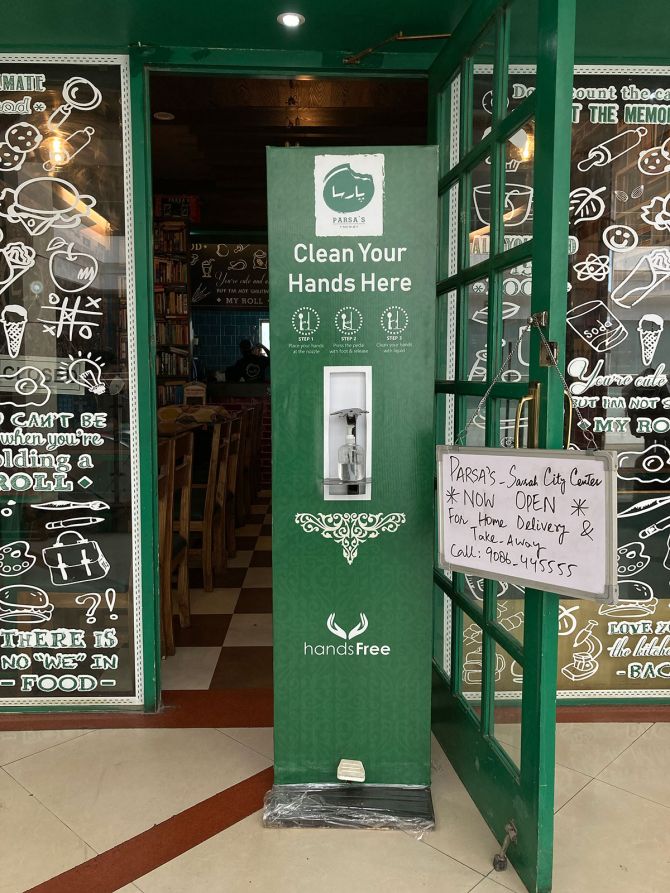
How were your interactions with customers when you briefly reopened your restaurant?
It was a good feeling when we opened and people told me how badly they missed dining out.
I opened my primary outlet for around eight or nine days. Home delivery for three days and dining in for five days with 50% occupancy
A majority of young people told me how they had taken the privilege of going to a restaurant and hanging out for granted.
They said they realised how important it was to socialise in parks and cafes. That's what made me respect my work and the connections with people more than ever.
Do you intend to keep your migrant employees in Kashmir till you reopen?
As long as I'm able to feed my family, I'm going to feed them also.
I think I have 40 plus non-Kashmiri employees who stay in different places and towns.
All the outlets have separate accommodation.
When do you intend to open your outlets?
When the Covid cases come down to around 50 in a day and the death count goes down to zero.
A restaurant is not an essential service. People can live without going to a restaurant. It's not life-saving enterprise and my rolls can wait.
In spite of this very difficult year, you have a lot of positivity and confidence about the future.
You don't have an option. You can either sink down or keep floating, and struggle to keep your boat running.
There are only two ways. There's no midway.
You have to believe in all the efforts you put in. I try and want to be in a position where I have nothing to lose in my business.
I'm not a very hardcore, practicing, Muslim, but my religion has taught me that nothing is permanent, and all that I have belongs to Allah.
Everything that is given to you is on the basis of your virtues and hard work.
Don't hold it permanent to your heart that when it goes away, it hurts a lot.
My Noida outlet is on verge of closure. But I can't help it. I can't stop it from going away.
Even if I have nothing in the next two years and all my outlets get shut, what I can do is learn from this adversity and make sure that I have not made any mistake in terms of business management or planning these outlets.
Even if nothing remains in my hand tomorrow, I am going to be there for myself. And that's what matters.
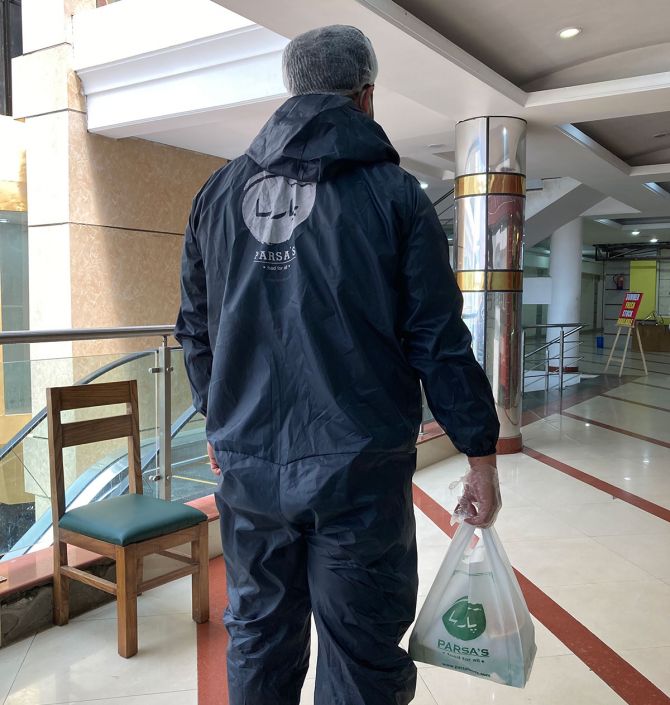
We all have to change the way we lived our lives once. How will you change the way you do business now?
I think it's very important to plan. I have always been a dreamer who would not think about the future and just live in the present and work hard.
I need to work to avoid small kinds of mismanagement on normal days, focus on saving to fight off the bad times.
I was thinking of creating a fund where all the outlet owners, all the franchisee partners would put a decent amount of money into one account, which we can utilise for the bad times.
I've always believed that my restaurant is an experience. Personally and as a businessman, I have never been a fan of home delivery myself, even as a customer.
But then, right now, we don't have an option, I might think of doing that again. This is not something I would want to do for a long time.
Feature Presentation: Aslam Hunani/Rediff.com
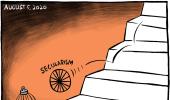







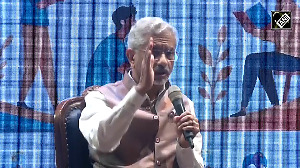


 © 2025
© 2025